Image: An employee walks between parked cars at Maruti Suzuki's stockyard.
Photographs: Amit Dave/Reuters. Abheek Barua
Photographs: Amit Dave/Reuters. Abheek Barua
Premised on the 'best-case scenario' in terms of growth and revenue, the Budget seems unprepared for a possible slowdown.
To be fair to the finance minister (FM), one can't complain of a "reforms" deficit in the Budget. Take tax reforms.
Even as the current avatar of the Direct Taxes Code (DTC) might be quite different from the form in which it was conceived, it is now certain that it will be in operation from 2012. Ditto for the Goods and Services Tax (GST), which is the more controversial of the two tax codes.. . .
Is the Budget's fiscal strategy credible?
Image: Homeless people prepare food on a roadside in Ahmedabad.Photographs: Amit Dave/Reuters.
If the FM tables the Bill for constitutional reform that is necessary for the GST, as he promised in his speech, we could at least have a half-way house in the form of a "dual" structure split between the Centre and states as early as next year. The finance minister also seems to be bought into the idea of direct cash transfers to target subsidies better. Once the expert committee that is studying its implementation makes its recommendations in June this year, we could expect some concrete steps. (Economists had, incidentally, been pushing for this for over a decade now). Foreign Institutional Investment (FII) limits in corporate bonds of infrastructure companies have been raised by a hefty $20 billion.
. . .
Is the Budget's fiscal strategy credible?
Image: Homeless people prepare food on a roadside in Ahmedabad.Photographs: Mukesh Gupta/Reuters.
The FM has also promised to table a number of financial reform Bills in the current session of Parliament. This includes the Insurance Laws (Amendment) Bill that could end up increasing the foreign direct investment (FDI) limit in the sector.
However, for people like me who are in the business of nit-picking, several things raise niggling doubts about the credibility of the Budget's near-term fiscal strategy. Let me get a couple of things out of the way first.
The FM has showed a fiscal deficit-to-GDP ratio of 5.1 per cent instead of the 5.5 per cent that was targeted for the current fiscal year.. . .
Is the Budget's fiscal strategy credible?
Image: A vendor sleeps inside a stall of watermelons at a roadside stall in Hyderabad.Photographs: Krishnendu Halder/Reuters.
The deficit projection of 4.6 per cent for 2011-12 is also getting a helping hand from this bounty of GDP revision. One could argue that for "genuine" fiscal consolidation, the ratio should have been set much lower. But even if one chooses to ignore that issue, the unavoidable question is: How easy will it be to get to the absolute deficit level of Rs 412,817 crore that yields this ratio? How credible are the revenue and expenditure projections that produce this gap? Is the actual gap likely to be smaller or larger?
. . .
Is the Budget's fiscal strategy credible?
Image: Labourers work at a construction site.Photographs: Krishnendu Halder/Reuters.
The deficit projection of 4.6 per cent for 2011-12 is also getting a helping hand from this bounty of GDP revision. One could argue that for "genuine" fiscal consolidation, the ratio should have been set much lower. But even if one chooses to ignore that issue, the unavoidable question is: How easy will it be to get to the absolute deficit level of Rs 412,817 crore that yields this ratio? How credible are the revenue and expenditure projections that produce this gap? Is the actual gap likely to be smaller or larger?
. . .
Is the Budget's fiscal strategy credible?
Image: A labourer takes rest besides sweet lime at a wholesale market in Hyderabad.Photographs: Krishnendu Halder/Reuters.
The fundamental problem I have with these projections is that they are underpinned by an aggressive GDP growth forecast of nine per cent or higher. These growth projections, for instance, are reflected in the tax projections that are expected to grow by about 18 per cent in 2011-12 on a base of 25 per cent growth in 2010-11. This assumes that tax revenues will not lose their current momentum. The disinvestment target of Rs 40,000 crore (Rs 400 billion), which depends somewhat more indirectly on growth, also seems a little aggressive.
. . .
Is the Budget's fiscal strategy credible?
Image: Commodity prices, a concern.
Why don't I share the FM's optimism on growth prospects for 2011-12? The key reason is that the entire community of professional economists and forecasters are predicting a considerable slowdown in growth for the next year. In fact, the consensus in this community is that growth for 2011-12 will be more in the ballpark of eight per cent rather than nine per cent. This relative pessimism is not without reason - interest rates have picked up, investments both in the public and private sector are sluggish, commodity prices are beginning to impinge on profitability and sentiment among investors seems to be plumbing new lows.
. . .
Is the Budget's fiscal strategy credible?
Image: Rupee notes.
For me, the FM's view that growth will actually pick up in 2011-12 over the 2010-11 levels is a highly risky, contrarian position. If it works, fine. If it doesn't, the deficit could go through the ceiling. There also appears to have been fairly serious "under-budgeting" of expenditures, particularly subsidies. This, incidentally, was a feature of the current year's Budget as well. The actual subsidy bill for 2010-11 turned out to be a good Rs 48,000 crore (Rs 480 billion) higher than the budgeted amount. There is a similar pattern for next year's expenditure plan.
. . .
Is the Budget's fiscal strategy credible?
Image: Pranab Mukherjee with Ministers of State of Finance, S.S. Palanimanickam and Namo Narain Meena.
Food subsidies for 2011-12 are kept flat at the current year's levels despite the prospect of the Food Security Bill going through this year. Oil subsidies are actually budgeted Rs 15,000 crore (Rs 150 billion) lower than 2011-12, which is really difficult to fathom given the enormous risks of supply disruption from the turmoil in West Asia and North Africa.
To cut a long story short, the Budget is premised on what forecasters call the "best-case" scenario in terms of growth and revenues for 2011-12. Forecasters will also tell you that the "best case" is, more often than not, least likely to prevail.
. . .
Is the Budget's fiscal strategy credible?
Image: Budget papers.Photographs: Courtesy, PIB.
As the year progresses the FM will have to turn to Parliament to supplement his expenditure sanctions. Revenues could fall short. The actual fiscal deficit for the year will turn out to be higher than the projected deficit. The corollary is that the government's draft on resources (through its market borrowing programme) could turn out to be much larger than the Budget projects. The financial markets have responded positively to the FM's speech. As they pore over the fine print, they are likely to turn a lot more circumspect.
Abheek Barua is Chief Economist, HDFC Bank.

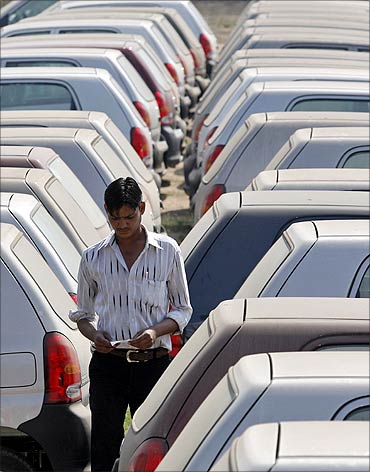


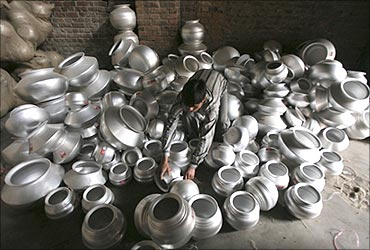

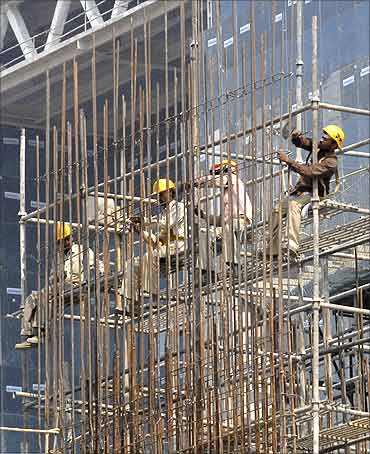


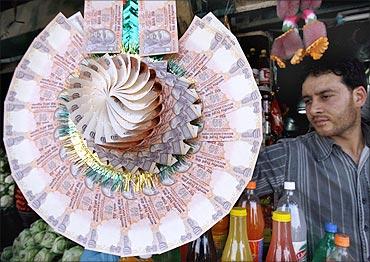
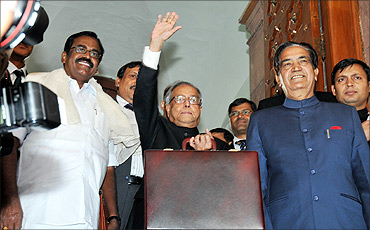


article